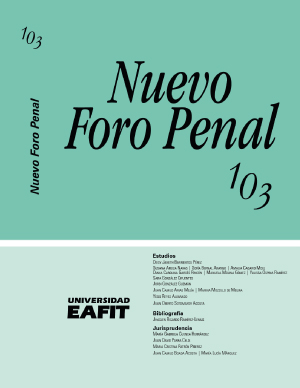Differences between Perpetration and Participation: The Special Jurisdiction for Peace in its Labyrinth.
Main Article Content
Keywords
Special Jurisdiction for Peace, Extrajudicial executions, Control over the fact, Power organizing mechanisms, Institutional competence, Command Responsibility
Abstract
In some decisions about extrajudicial executions, the Special Jurisdiction for Peace refrains from applying the theory of power organizing mechanisms to support the responsibility of military commanders and, instead, resorts to a mixture of theories such as the institutional guarantees positions theory, subjective theory, the formal objective theory, and the functional control over the fact theory, to conclude that military commanders are intellectual perpetrators of these crimes. At the same time, those who executed them are improper joint perpetrators.
Downloads
References
BGHSt 8, 393.
Corredor, Diego. “La determinación”. Revista de Derecho Penal y Criminología 25, n.°75 (2004): 159-70.
Engisch, Karl. Die Kausalität als Merkmal der strafrechtlichen Tatbestände. Tübingen: Verlag von J. C. B. Mohr, 1931.
Georg Wächter, Carl. Lehrbuch des Römisch-Teutschen Strafrechts. Sttutgart: Metzler’schen Buchhandlung, 1825, erster Theil.
Jakobs, Günther. “Beteiligung”. En Lampe Festschrift. Berlin: Duncker & Humblot, 2003.
Jakobs, Günther. Der strafrechtliche Handlungsbegriff, Schriften der Juristischen Studiensgesellschaft Regensburg. München: C.H. Beck, 1992.
Jakobs, Günther. Derecho penal. Traducido por Joaquín Cuello Contreras y José Luis Serrano González de Murillo. Madrid: Marcial Pons, 1997.
Jurisdicción Especial Para la Paz. Sala de reconocimiento de verdad, de responsabilidad y de determinación de los hechos y conductas. Auto SUB D – Subcaso Antioquia – 062, decisión del 30 de agosto de 2023.
Lesch, Heiko. Intervención delictiva e imputación objetiva. Bogotá: Universidad Externado de Colombia, 1995.
Luzón-Peña, Diego Manuel. “Autoría e imputación objetiva en el delito imprudente: valoración de las aportaciones causales”. En Derecho penal de la circulación. Barcelona: Bosch, 1985.
Luzón-Peña, Diego Manuel. “Concurrencia de culpas y autoría o participación en los delitos imprudentes”. En Derecho penal de la circulación. Barcelona: Bosch, 1985.
Maurach, Reinhart. Tratado de Derecho Penal. Traducido por Juan Córdoba Roda. Barcelona: Ariel, 1962, Tomo II.
Mir Puig, Santiago. Derecho Penal – parte general. 10ª ed. Barcelona: Reppertor, 2016.
Reinhard, Frank. Das Strafgesetzbuch für das Deutsche Reich. 18ª ed. Tübingen: Verlag von J. C. B. Mohr, 1931.
Reyes-Alvarado, Yesid. “La teoría del dominio del hecho: el fin de un ciclo”. En ¿Autonomía y accesoriedad? Editado por Andrés Falcone. Marcial Pons: Madrid – Barcelona – Buenos Aires – Sao Paulo, 2021.
Reyes-Alvarado, Yesid. “Fundamentos teóricos de la imputación objetiva”. Anuario de Derecho Penal y Ciencias Penales XLV (1992): 933-968.
Reyes-Alvarado, Yesid. “Intervención delictiva e imputación objetiva”. Anuario de Derecho Penal y Ciencias Penales, LX (2007): 97-117.
Reyes-Echandía, Alfonso, Tipicidad. 6ª ed. Bogotá: Temis, 1997.
RGSt 3, 182.
RGSt 74, 85.
Roxin, Claus. Autoría y dominio del hecho en derecho penal. Traducido por Joaquín Cuello Contreras y José Luis Serrano González de Murillo. Madrid: Marcial Pons, 2000.
Roxin, Claus. Derecho penal – parte general. Traducido por Diego Manuel Luzón Peña, Miguel Díaz y García Conlledo y Javier de Vicente Remesal. Madrid: Civitas, 1997, Tomo I.
Roxin, Claus. Derecho penal – parte general. Traducido por Diego Manuel Luzón Peña, Miguel Díaz y García Conlledo y Javier de Vicente Remesal. Madrid: Civitas, 1997.
STS 400/2017, de 1 de junio.
Von Buri, Maximilian. Abhandlungen aus dem Strafrecht - Beilageheft zum Gerichtssaal, Band XXIX. Sttutgart: Verlag von Ferdinand Enke, 1878.


